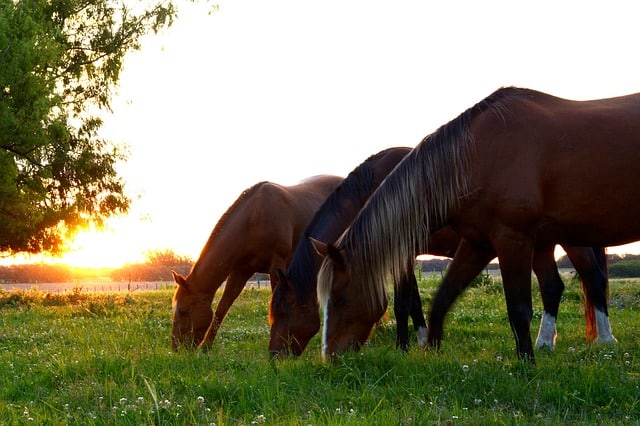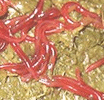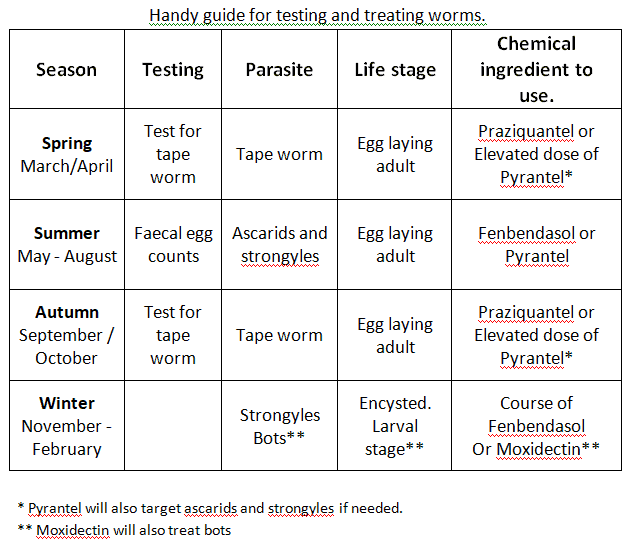
It’s safe to say we are all aware of the fact horses, just like all animals, carry internal parasites that can cause serious health issues and even death. However, are we really aware of how the horse picks them up, or even the best way to properly control them? De-worming the domesticated horse has become a must, the use or miss-use of chemical de-wormers has lead to resistance to some of the ingredients and people are beginning to realise that parasite control is more than just sticking a paste into the horse’s mouth every now and again. This Equine Worming Guide, will give you a Multi Pronged Approach to tackle the Problems of Worms in your horse.
The Horse & Parasites
The horse and its internal parasites have evolved together, the parasite is actually not in the business to cause the horse’s death as without the horse it would cause its own demise. It relies on the horse for its existence as it is host specific and would not survive in other animals.
The fact that we keep horses in small areas of land and tend to use the same piece of land consistently and exclusively for grazing by horses has lead to higher than intended contamination of grazing and higher burden of worms inside the horse thus requiring the use of chemical de-worming programs.
In the natural scheme of things the horse would never be forced to graze heavily contaminated pasture as it would be continually roaming and moving on to fresh grazing. This then allowed another species to follow on behind and ingest the larva of the equine worm and thus clean up the grazing for the horse to return and graze again. The management of grazing is key to keeping the worm burden to a tolerable level and likely more important than de-worming.
The Culprits.
The main categories of worms are Round worms or Strongyles and Ascarids. Also troublesome are Tape Worms, Pin Worms and Bots but generally to a lesser extent.
Ascarids

When outside the horses system these two differ in the way they exist. Ascarid eggs remain as eggs in the pasture and await consumption by the grazing horse. They are somewhat protected from environmental damage and can survive several seasons in a viable form. Generally speaking foals are more at risk with Ascarids as they have not much resistance to them and will pass eggs out between weanling and yearling age and so contaminate the pasture with eggs that are likely to be there for next year’s crop of foals to ingest. This is especially true if the same paddocks are used for foals season after season. Adult horses have a resistance and unless compromised by other issues rarely have over high burdens.
Strongyles

The strongyles overwinter in the intestine of the horse in an encysted form, they develop into adult egg laying worms in the spring and the eggs are passed out in the droppings. The eggs hatch and go through 3 larval stages, in stage 3 they travel up the grass where they can be eaten by the grazing horse. Over grazed pasture, high stocking rates and single species grazing year after year increase the likelihood of a highly contaminated pasture. Combine that with Irelands temperate and wet climate it’s not surprising that horses get more than a manageable level of parasite burden.
The solution
The solution is not about eliminating all parasites by the use of chemical de-wormers, it is widely known that resistance to the active ingredients in the de-wormers is increasing. Active ingredients such as Benzimidanzole and Pyrantel are beginning to be ineffective and resistance to the use of Ivomectin and Moxidectin is wide spread. Most horses can tolerate a residual worm burden, it is vital to keep it to just that, TOLERABLE!
It is important to only worm when necessary and to use the correct dosage by weight for each horse. Never round the dose down as giving a less than the required amount causes resistance. While some horses are masters of evading the dosing syringe or spitting out what they pretended to swallow, it is very important to make sure they get a full dose for their weight.
NB*When De-worming never round the dose down, as giving a less than the required amount causes resistance.
Target Horses that Need Worming
The use of de-wormers should be targeted at animals that have been identified as being in need. This can be ascertained by the use of faecal egg counts. These should be carried out every 3 to 4 months and will identify the level of egg laying adults but not encysted strongyles. These are hard to dose for anyway, hence the need for repeated testing. Tape worms require an antibody test, which can now be done by taking a swab of saliva and having it tested for the antibodies the horse has in its system against the tape worm.
Collecting Droppings from Paddocks
The collection of droppings from paddocks is an effective way of reducing paddock contamination, although time consuming and back breaking if done by hand, there is specialized equipment that can be used to collect the manure in a slightly more efficient way. By removing the droppings at least twice a week it can prevent the eggs in them from hatching and entering the pasture. As the eggs can survive for several years in the soil once the droppings break down on the pasture, they contaminate it, this is difficult to overcome unless you graze for 3 years with another species or plough the land.
Rotational/Mixed Grazing as a means of Control
Rotational grazing with other species or mixed grazing can be an effective way of reducing the burden to a tolerable level. Sheep are good at grazing evenly and can follow after horses. They tend to eat shorter grass than the horses and so are effective at eating low down where eggs and larva tend to be.
Reducing Stocking Levels
The height of the grazing can also be influential to the horses. Over grazed paddocks force the horse to eat closer to the ground where they are likely to ingest more eggs and larva. They are also likely to graze closer to the rough areas where they have dunged and these areas have higher significance of eggs and larva from the droppings in them. Not grazing these areas is the horse’s natural protection mechanism against picking up the parasites.
Reducing stocking levels and moving horses to fresh paddocks is ideal but not always practical, especially as they need to be off for more than 4 weeks and considerably longer if the weather is humid or wet.
Harrowing on a Hot Day May Not be Enough.
Harrowing on a hot day has long been thought to kill off the parasites in the droppings but in reality it won’t kill the eggs and only spreads them around thus forcing the horse to eat contaminated grazing rather than choosing to avoid it. The larva would need to be in the 3rd stage of development to be killed. At this point they can no longer feed and if not eaten by the horse will use up their food reserves and die. This happens much quicker in hot weather. Again in reality Ireland rarely gets these temperatures for consistently long enough to be an effective control.
Frost in Winter Can Help.
At the opposite end of the scale in freezing conditions parasites do not do so well, especially strongyles. For this to be effective it is important to have a short grass cover to allow the cold to get down to where the parasites are and have several freeze, thaw cycles. Again not always something we always get in our winters.
If it is not possible to reduce stocking density or rotate grazing with other species then an educated use of good paddock hygiene as in removal of droppings, faecal testing to identify horses at risk and controlled use of the correct type of de-wormer is required.
So what’s the plan?
Having done your best to pick up droppings the next strategy is testing. By doing this you will only treat horses that have been identified as having more than a tolerable burden.
Test Spring and Autumn for tape worm and only treat animals with high antibody levels. Use a product containing praziquantel or a dose of a wormer containing pyrantel; it may be necessary to give a double dose.
Do Faecal egg counts during the summer to identify parasitized horses treat them with a product containing pyrantel or fenbendasole.
During the winter treat encysted red worm. Use a product containing fenbendazole at a high level. This may be a course of several days’ treatment. Alternately use a Moxidectin based product. This will kill bots as well, so use it after the first hard frost when all egg laying adults will also be dead.

In Conclusion
Always remember to worm all new arrivals before they go out to graze as you do not know their history. Use a fenbendasole course as this will treat for encysted red worm so as to avoid migrating larva causing spring colic’s, as well as for egg laying adults if they are present. Test for tape worms only but only treat if required.
If you regularly use one particular chemical ingredient and find you are getting to many high counts try switching to a different chemical, you may be developing a resistance.
While it will never be possible to eliminate parasites completely, by using a multi pronged approach we can reduce them to a tolerable level. This will reduce the need to worm and ultimately save you money. By identifying the horses that have a higher burden and only using chemical de-worming on them we should reduce the likely hood of worm resistance to the chemicals we have become reliant on before it’s too late.
This Article originally appeared in the December 2019 Issue of Irish Sport Horse Magazine. Jessica Soley is a level 5 performance coach and senior assessor for the British Horse Society. Having competed and run her own competition yard she is now an Equine Tutor for QQI Equine courses at level 5&6 run by KWETB in Kildare
